|
|
|
Sort Order |
|
|
|
Items / Page
|
|
|
|
|
|
|
| Srl | Item |
| 1 |
ID:
187444
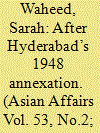

|
|
|
|
|
| Summary/Abstract |
This paper revisits the violent annexation of the erstwhile princely state of Hyderabad by the Indian army in 1948 as an inaugural moment of dispossession to reconstruct Hyderabad's twentieth century past along the axes of Muslim belonging and memory. I argue that we must situate twentieth and twenty-first century Hyderabadi Muslim migration in relation to Partition-related displacements and attempts to overcome them through economic conditions provided by migration. The partition of India prompted waves of migration—such as the later migration of Hyderabadi Muslims to the Persian Gulf in the wake of 1970s oil boom—and their sense of displacement persisted long past the mid-twentieth century, reshaping Muslim notions of belonging. The use of the nation-state as the dominant framework to analyze these shifts is insufficient for understanding Hyderabadi Muslims' sense of belonging and citizenship, which must be also contextualized in terms of upward class mobility along the axes of global and local contexts.
|
|
|
|
|
|
|
|
|
|
|
|
|
|
|
|
| 2 |
ID:
168183
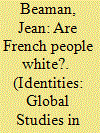

|
|
|
|
|
| Summary/Abstract |
Based on ethnographic research of France’s North African second-generation, I bring together literatures on racial formation, whiteness, and race and racism in Europe to discuss how whiteness operates in French society. I discuss how respondents must navigate a supposedly colorblind society in which whiteness is default. Because these individuals are racialized as non-white, they are not seen as French by others. I discuss how they wrestle with definitions of French identity as white and full belonging in French society as centered on whiteness. I argue that salience of whiteness is part of France’s racial project in which differences among individuals are marked without explicit state-sanctioned racial and ethnic categories. This has implications for considering how whiteness is crucial to understanding European identity more broadly, including through the rise of the Far-Right, the recent Brexit and Leave campaigns, and anti-immigration sentiment throughout Western Europe.
|
|
|
|
|
|
|
|
|
|
|
|
|
|
|
|
| 3 |
ID:
167649
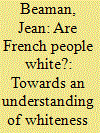

|
|
|
|
|
| Summary/Abstract |
Based on ethnographic research of France’s North African second-generation, I bring together literatures on racial formation, whiteness, and race and racism in Europe to discuss how whiteness operates in French society. I discuss how respondents must navigate a supposedly colorblind society in which whiteness is default. Because these individuals are racialized as non-white, they are not seen as French by others. I discuss how they wrestle with definitions of French identity as white and full belonging in French society as centered on whiteness. I argue that salience of whiteness is part of France’s racial project in which differences among individuals are marked without explicit state-sanctioned racial and ethnic categories. This has implications for considering how whiteness is crucial to understanding European identity more broadly, including through the rise of the Far-Right, the recent Brexit and Leave campaigns, and anti-immigration sentiment throughout Western Europe.
|
|
|
|
|
|
|
|
|
|
|
|
|
|
|
|
| 4 |
ID:
190117
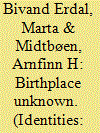

|
|
|
|
|
| Summary/Abstract |
When naturalised citizens receive their passport, it is material and symbolic proof of membership in the nation-state, tying the individual to the nation and providing mobility resources. For naturalised Norwegian citizens, their birthplace appears in the passport. What might be the implications of removing this information? In 2016, the Norwegian government replaced birthplace details with ‘birthplace unknown’ in the passports of naturalised citizens from 31 Asian and African countries. Drawing on this case and 41 in-depth interviews with people of different citizenship-statuses, we analyse the role of the passport and birthplace information in it for naturalised citizens’ identity-construction. The procedural change led to an experience of devalued citizenship in practical, emotional, and symbolic ways, by those directly affected and others, showing the precariousness of identity for naturalised citizens. We find that the passport matters for identity-construction, as a symbol of national belonging, and suggests more-than-instrumental approaches to citizenship among immigrant populations.
|
|
|
|
|
|
|
|
|
|
|
|
|
|
|
|
| 5 |
ID:
152443


|
|
|
|
|
| Summary/Abstract |
Nation and diversity are often cast in oppositional terms. The present joint intervention explores the limits and possibilities of what we call ‘inclusive nation’, i.e. a nation which embraces rather than expunging diversity. To reflect on this idea, the Loughborough University Nationalism Network (LUNN) organized a symposium, bringing together both academics and relevant stakeholders, to explore both theoretically and practically the feasibility of the inclusive nation. For reason of space, here we present only the theoretical views of academics. While Billig and Yuval-Davis highlight the inherent exclusive thrust of nationalism, Kaufmann and Hearn suggest two distinct ways to move away the traditional understanding of nationalism as a site of singularity, oppression and exclusion. A final rejoinder by Nyhagen pushes the debate further interrogating the boundaries of national belonging.
|
|
|
|
|
|
|
|
|
|
|
|
|
|
|
|
| 6 |
ID:
145865
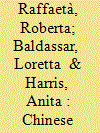

|
|
|
|
|
| Summary/Abstract |
This article explores the experiences of young people of Chinese background in Prato (Italy). Despite significant social exclusion, young Chinese develop a sense of belonging to Prato by creating local, translocal and transnational affiliations and interconnections. These relationships contribute to making an often overtly hostile local reality, liveable and meaningful. A central aim of this article is to examine the intersection between migration studies and youth studies. The former tend to focus on the processes of identity formation featuring ethnic background, hence the label ‘second generation’. In contrast, the latter tend to foreground age- and generation-specific practices of belonging that may extend beyond ethnic identification, hence the focus on ‘youth’. We argue that bringing migration and youth studies together – by complicating notions of home and host, migrant and local identity and belonging – helps us to better understand how young people are managing multiplicity and mobility (and situatedness and stasis/fixity).
|
|
|
|
|
|
|
|
|
|
|
|
|
|
|
|
| 7 |
ID:
139461
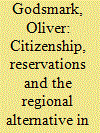

|
|
|
|
|
| Summary/Abstract |
This paper unearths an alternative paradigm through which to consider the discussions and debates between members of the Indian public, government bureaucrats and Congress Party politicians about the rights and interests of Indian citizens both before and immediately after India's Independence in 1947. It argues that much of the recent historical work on citizenship during this period has been preoccupied with issues of nationality and religious community as a result of the fallout from Partition. However, the demands and deliberations over the introduction of provincial forms of affirmative action in the all-India services at this time are indicative of a different narrative. First, many provincial representations of ‘minority’ rights often took into account differences of caste and language instead. Second, and perhaps more importantly, the term minority was employed not only to describe demographic minority status, but also to define under-represented groups in the all-India services. In doing so, these different provincial policies prioritised particular local rights to representation, in which citizenship was expressed through a regional idiom.
|
|
|
|
|
|
|
|
|
|
|
|
|
|
|
|
| 8 |
ID:
164303
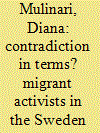

|
|
|
|
|
| Summary/Abstract |
Right-wing, xenophobic and racist parties have enjoyed immense successes in Europe in recent decades. In Sweden, the third-largest party in Parliament is the Sweden Democrats (SD), with 13% in the 2014 general election. Sympathy for the SD among foreign-born Swedish citizens, both women and men, is far lower than among Sweden-born men, but an increasing number of Swedish citizens with migrant backgrounds support the party. The aim of this article is to explore the subject positions open for citizens with migrant background in the Swedish public space with special focus on the identities and worldviews developed by migrant activists who have joined the SD party and are, to differing degrees, racialised and perceived as non-Swedish. Using the concept of migrant respectability, this research is intended to understand why and under what circumstances migrants chose to join and represent a xenophobic and racist party.
|
|
|
|
|
|
|
|
|
|
|
|
|
|
|
|
| 9 |
ID:
153227
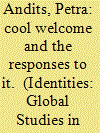

|
|
|
|
|
| Summary/Abstract |
This article examines the social aspects of Australian-Hungarians’ return to Hungary after the collapse of communism. I suggest that one of the most disillusioning aspects of homecoming for this group of Australian-Hungarians was the cold welcome they received from those who had stayed behind. The main task of this article is to analyse how returnees grappled with the negative attitudes of the stayees. Three major strategies are identified by means of which returnees facilitated their feeling of belonging: contestation, acceptance or dismissal of stayees’ perspectives. Returnees’ efforts to achieve a sense of belonging suggest that the nature of national membership is fundamentally fragile and porous and underlines that self-definitions are far from being either unconditional or ascribed. By placing contrasting narratives side by side, this article draws attention to the intersubjective elements involved in defining belonging.
|
|
|
|
|
|
|
|
|
|
|
|
|
|
|
|
| 10 |
ID:
116589
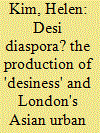

|
|
|
|
|
| Publication |
2012.
|
| Summary/Abstract |
Increasingly, the term 'desi' amongst British Asians has been commonly used to describe South Asian diasporic cultural forms and practices, particularly regarding musical genres and styles. This article opens up debate on its contested meanings and usage within the London Asian urban music scene. In unpacking the complex and contradictory meanings and uses of 'desi' across time, space and place, 'desiness' becomes exemplary of the ambivalent spaces of youthful diasporic identities in process. I argue that cultural practices, such as music production and consumption, provide critical tools to critique one-dimensional notions of 'Britishness' and 'Asianness', as well as to reassert normative notions of belonging and diaspora. The exploration of diasporic identities in the making within the spaces of London Asian cultural production highlights the importance of everyday forms and practices and fosters a better understanding of multiculture and new modes of belonging in London.
|
|
|
|
|
|
|
|
|
|
|
|
|
|
|
|
| 11 |
ID:
158426
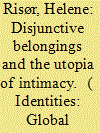

|
|
|
|
|
| Summary/Abstract |
The paper analyses practices of intimacy among youth in a poor, crime-ridden neighbourhood of Santiago. It argues that their sense of belonging to their neighbourhood and broader society is disjunctive: they inhabit the nation-state without complying with expectations of proper citizenship. Similarly, they dwell in their neighbourhood without identifying with it. Instead, they turn to intimate relations with friends and lovers as spaces of belonging. Through these often failing relationships, they pursue emotional and socio-economic stability and seek to fulfil expectations of social becoming and mobility. These intimate and romantic practices can both be understood as an utopian, affective promise that allows for imagining possibilities of a good life and as a moral exercise in the realisation of an adjacent self and we argue that intimacy constitutes a key site in the quest for social belonging among subaltern youth in neoliberal Chile.
|
|
|
|
|
|
|
|
|
|
|
|
|
|
|
|
| 12 |
ID:
160102
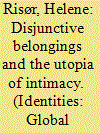

|
|
|
|
|
| Summary/Abstract |
The paper analyses practices of intimacy among youth in a poor, crime-ridden neighbourhood of Santiago. It argues that their sense of belonging to their neighbourhood and broader society is disjunctive: they inhabit the nation-state without complying with expectations of proper citizenship. Similarly, they dwell in their neighbourhood without identifying with it. Instead, they turn to intimate relations with friends and lovers as spaces of belonging. Through these often failing relationships, they pursue emotional and socio-economic stability and seek to fulfil expectations of social becoming and mobility. These intimate and romantic practices can both be understood as an utopian, affective promise that allows for imagining possibilities of a good life and as a moral exercise in the realisation of an adjacent self and we argue that intimacy constitutes a key site in the quest for social belonging among subaltern youth in neoliberal Chile.
|
|
|
|
|
|
|
|
|
|
|
|
|
|
|
|
| 13 |
ID:
183482
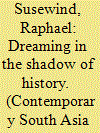

|
|
|
|
|
| Summary/Abstract |
Spatial mobility is often considered on large geographical scales: people move from distant villages to global cities, they migrate from one country to the next, or even to a whole new continent. Such large-scale migration comes with shifts in economic position, social status and cultural exposure, shifts that condition new figurations of belonging – or so the argument goes. In contrast, I ethnographically follow the looping movements of three young men in Lucknow who aspire to migrate but remain stuck, who find a whole new world by crossing the river, whose small steps reflect big dreams. As the world grapples with ‘lockdowns’ and ‘stuckedness’ in the Covid-19 pandemic, I sketch their aspirations, mental maps and the material restraints that condition their trajectories. Through them, I demonstrate how looping micro-mobilities – cruising through the night, dancing on stage, riding one's bike – can be as effective in fostering new figurations of belonging as the grand movements emphasized in literature on migration. I further explore which spaces enable and contain such micro-mobilities, rediscovering the potency of urban settings to make people feel at home and out of place in small but important ways.
|
|
|
|
|
|
|
|
|
|
|
|
|
|
|
|
| 14 |
ID:
184077


|
|
|
|
|
| Summary/Abstract |
How the transition to adulthood is understood by youths can be influenced by social context and cultural background/s. Employing a voice-centred relational methodology approach, underpinned by a framework of identity and belonging, this paper reports on one aspect of a larger qualitative study designed to better understand the transition to adulthood as experienced by Australian Sudanese and South Sudanese youths. The findings of this study suggest that the perspectives on the transition to adulthood held by participants were based on feelings of possessing certain character traits and values they associated with the identity ‘adult’. These findings are relatively consistent with previous research. Yet, the utility and value of this transition was also presented by participants as being inherently collective (i.e. to contribute within one’s community). However, several barriers relating to social belonging were identified by participants to influence, and in some instances, impede a successful transition to adulthood.
|
|
|
|
|
|
|
|
|
|
|
|
|
|
|
|
| 15 |
ID:
177891
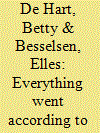

|
|
|
|
|
| Summary/Abstract |
Academic literature has studied the legal consciousness of common citizens: the way ordinary people think and talk about law in their everyday lives. Building on this literature, we explore how Dutch female citizens with a migrant partner experience the impact of migration law on their everyday lives. We questioned how legal consciousness is linked to intimate citizenship, thus demonstrating how ‘private’ matters such as intimate relationships, marriage, and family have a profound impact on citizenship. Based on two sets of interviews, conducted in 2000 and 2016, we were able to determine how these women, despite being citizens formally, experienced the profound impact of increasingly restrictive family reunification policies. Contrary to our expectations, female sponsors continued to express considerable support for restrictive migration law. In performing intimate citizenship, they claimed an exception from the strict application of the rules for their particular family situation, rather than radical change.
|
|
|
|
|
|
|
|
|
|
|
|
|
|
|
|
| 16 |
ID:
180572
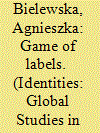

|
|
|
|
|
| Summary/Abstract |
The aim of this paper is to explore the identification choices of highly skilled migrants employed by companies in the Wałbrzych Special Economic Zone in south-west Poland in order to discuss how their identity is constructed and performed, especially how conflictual identifications are managed. Analysis of qualitative data shows the migrants call both their place of origin and their new place of life home. They identify as inhabitants of their new city and talk about gaining some traits of Polish national identity but they stress strong national identity related to their home country. Conflicts of loyalties in these hybrid identities are solved through a label game. Migrants identify with groups at different scales, from local groups, through city and national, to supranational. By playing with the scale of groups they can avoid conflicting identifications.
|
|
|
|
|
|
|
|
|
|
|
|
|
|
|
|
| 17 |
ID:
177892
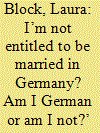

|
|
|
|
|
| Summary/Abstract |
The state interferes with the intimate spheres of families and couples via family migration policies, which have grown increasingly restrictive in many European countries. Mixed-status couples engaging in spousal migration develop coping strategies in order to adapt to hurdles and overcome them. This article explores the under-researched perspectives of sponsor spouses on (family) migration policies. When interacting with authorities, politicians or counselling services, the sponsors often react discursively, using arguments relating to human rights, citizenship, membership as well as gender and marriage/family norms. Based on a qualitative analysis of case dossiers of a German NGO counselling mixed-status couples, the article explores the narratives and strategies developed by the (mostly White) German citizen sponsors, thereby analysing the ways they ‘perform citizenship’ at the crossroads of migration control, marriage and family norms, and membership.
|
|
|
|
|
|
|
|
|
|
|
|
|
|
|
|
| 18 |
ID:
155077
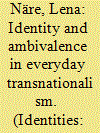

|
|
|
|
|
| Summary/Abstract |
This article analyses questions of belonging amongst elderly Gujaratis who live in North London but maintain connections with India and East Africa. Belonging, which encompasses both the sense and practices of belonging, is a useful concept for analysing identity-related matters. This research argues that identity and belonging are important for subjective and emotional well-being in old age. This target group practises belonging locally and through transnational mobility, which follows an annual rhythm. However, increasing bodily frailty related to ageing reduces this mobility. Moreover, this article examines belonging-related ambivalences that arise in old age and that stem from dislocation experiences and contradictions that individuals encounter when confronting racialised and patriarchal social structures. In conclusion, the article calls for the integration of older individuals’ experiences into the mainstream identity and belonging research.
|
|
|
|
|
|
|
|
|
|
|
|
|
|
|
|
| 19 |
ID:
130385
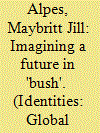

|
|
|
|
|
| Publication |
2014.
|
| Summary/Abstract |
This article addresses the migration aspirations of young, lower middle-class Cameroonians living in Anglophone Cameroon. Deportations and prevention campaigns portray the negatives of migration, yet often have little impact because they assume that migrants' aspirations are grounded in the prior success of other migrants. This research takes its lead from the question: Why aren't aspiring migrants in Cameroon discouraged by migration failure? It is based on an ethnographic fieldwork conducted between September 2007 and January 2009 in Buea (South West Cameroon). Since the late 1990s, the desire for a future 'away from home' has come to be expressed in Anglophone Cameroon by aspirations of going to 'bush'. Taking seriously people's conceptions of success and failure in places of departure, the article argues that locally voiced claims of 'global belonging' exert an important influence on migration aspirations. An understanding of deeply rooted migration desires must include an analysis of identity politics.
|
|
|
|
|
|
|
|
|
|
|
|
|
|
|
|
| 20 |
ID:
177889
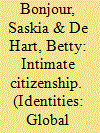

|
|
|
|
|
| Summary/Abstract |
This special issue investigates citizenship and belonging in mixed-status families, i.e. families consisting of both citizens and non-citizens. We critique the standard perception of citizenship as ‘hard on the outside and soft on the inside’. For citizens with non-citizen family members, the exclusionary nature of citizenship is very much ‘inside’, in the very heart of their families. We deploy the concept of ‘performing intimate citizenship’ to understand how citizens deal with migration regulations that hinder them from living with their families. Often this is a first, shocking confrontation with state intervention into their private lives. Protesting such interventions – in court, in collective mobilisation, in letters to the authorities – involves making claims both about who belongs and about what ‘proper’ family is. Thus, citizens and their non-citizen family members ‘perform intimate citizenship’: they express what citizenship is and should be, by mobilising intersecting conceptions of intimacy and of belonging.
|
|
|
|
|
|
|
|
|
|
|
|
|
|
|
|
|
|
|
|
|